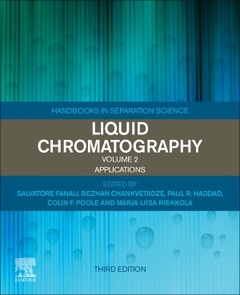Liquid Chromatography (3rd Ed.) Applications Handbooks in Separation Science Series
Langue : Anglais
Coordonnateurs : Fanali Salvatore, Chankvetadze Bezhan, Haddad Paul R., Poole Colin, Riekkola Marja-Liisa

Liquid Chromatography: Applications, Third Edition delivers a single source of authoritative information on all aspects of the practice of modern liquid chromatography. The text gives those working in academia and industry the opportunity to learn, refresh, and deepen their understanding of the field by covering basic and advanced theoretical concepts, recognition mechanisms, conventional and advanced instrumentation, method development, data analysis, and more. This third edition addresses new developments in the field with updated chapters from expert researchers. The book is a valuable reference for research scientists, teachers, university students, industry professionals in research and development, and quality control managers.
1. Sample preparation for liquid chromatography 2. Derivatization in liquid chromatography 3. Basic principles for the selection of liquid chromatographic mode for specific application (new chapter) 4. Amino acid and bioamine separations 5. Separation of lipids 6. Analysis of neurotransmitters and their metabolites by liquid chromatography 7. Analysis of natural toxins by liquid chromatography 8. Peptides and Proteins separations 9. Proteomics (new chapter) 10. Liquid chromatographic separation of oligonucleotides 11. Separation of glycans and monosaccharides 12. Metabolic phenotyping (metabonomics/metabolomics) by liquid chromatography-mass spectrometry 13. Principles, current applications, and future perspectives of liquid chromatography-mass spectrometry in clinical chemistry 14. Doping Analysis (new chapter) 15. Environmental analysis: Atmospheric samples 16. Environmental analysis: Emerging pollutants 17. Analysis of Microplastics (new chapter) 18. Environmental analysis: Persistent organic pollutants 19. Foodomics: LC and LC-MS-based omics strategies in food science and nutrition 20. Compositional analysis of foods 21. Multiresidue methods for pesticides and related contaminants in food 22. Analysis of vitamins by liquid chromatography 23. Determination of veterinary drug residues in foods by liquid chromatography-mass spectrometry: Basic and cutting-edge applications 24. Liquid chromatographic separation of enantiomers 25. Liquid chromatography in the pharmaceutical industry 26. Analysis of pharmaceutically and biologically relevant isoforms (new chapter) 27. Forensic toxicology 28. Analysis of Natural Products by liquid chromatography 29. Speciation and element specific detection
Salvatore Fanali is Director of Research at the Institute of Chemical Methodologies, Italian National Research Council (C.N.R.) in Monterotondo (Rome), Italy, and head of the Capillary Electromigration and Chromatographic Methods Unit at the same Institute. His research activity is mainly focused on separation science including the development of modern miniaturized techniques (electrodriven and liquid chromatography). He also studies hyphenation with mass spectrometry and development of new stationary phases. Separation methods developed are currently applied to food, pharmaceuticals, chiral environment, and biomedical analysis. He is Editor of the Journal of Chromatography A and a member of the advisory editorial board of seven international scientific journals. Fanali is the author of about 300 publications including some book chapters. He received several awards including the “Liberti Medal in Separation Science from the Italian Chemical Society.
Bezhan Chankvetadze is professor of Analytical Chemistry at Tbilisi State University, Editor of Journal of Pharmaceutical and Biomedical Analysis, and is well recognized in the field of separation science. He is one of the leaders in chromatography and chiral separations with a large number of publications.
Paul Haddad is currently a Distinguished Professor of Chemistry and Australian Research Council Federation Fellow at the University of Tasmania, as well as Director of the Pfizer Analytical Research Centre. He has more than 500 publications in this field and has presented in excess of 450 papers at local and international scientific meetings. He is an editor of Journal of Chromatography A, a contributing editor for Trends in Analytical Chemistry, and was an editor of Analytica Chimica Acta for 6 years. He is currently a member of the editorial boards of 10 other journals of analytical chemistry or separation science.
He is the recipient of several national and international awards, including the ACS A
Bezhan Chankvetadze is professor of Analytical Chemistry at Tbilisi State University, Editor of Journal of Pharmaceutical and Biomedical Analysis, and is well recognized in the field of separation science. He is one of the leaders in chromatography and chiral separations with a large number of publications.
Paul Haddad is currently a Distinguished Professor of Chemistry and Australian Research Council Federation Fellow at the University of Tasmania, as well as Director of the Pfizer Analytical Research Centre. He has more than 500 publications in this field and has presented in excess of 450 papers at local and international scientific meetings. He is an editor of Journal of Chromatography A, a contributing editor for Trends in Analytical Chemistry, and was an editor of Analytica Chimica Acta for 6 years. He is currently a member of the editorial boards of 10 other journals of analytical chemistry or separation science.
He is the recipient of several national and international awards, including the ACS A
- Emphasizes the integration of chromatographic methods and sample preparation
- Provides important data related to complex matrices, sample preparation, and data handling
- Covers the most interesting and valuable applications in different fields, e.g., proteomic, metabolomics, foodomics, pollutants and contaminants, and drug analysis (forensic, toxicological, pharmaceutical, biomedical)
- Offers comprehensive updates to all chapters
- Adds new chapters on selection of liquid chromatographic mode, proteomics, doping analysis, analysis of microplastics, and analysis of pharmaceutically and biologically relevant isoforms
Date de parution : 04-2023
Ouvrage de 1084 p.
19x23.4 cm
Thèmes de Liquid Chromatography :
Mots-clés :
Theory; HPLC; Stationary phases; Kinetic; Column technology; Equilibria; Interaction; Method development; Detectors; Resolution mechanisms
© 2024 LAVOISIER S.A.S.



